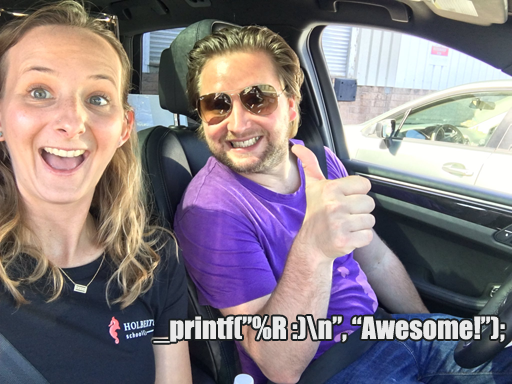Background Context
Write your own printf function.
Resources
Read or watch:
- Secrets of printf
- Group Projects concept page (Don’t forget to read this)
- Flowcharts concept page
man or help:
printf (3)
Requirements
General
- Allowed editors: vi, vim, emacs
- All your files will be compiled on Ubuntu 20.04 LTS using gcc, using the options -Wall -Werror -Wextra -pedantic -std=gnu89
- All your files should end with a new line
- A README.md file, at the root of the folder of the project is mandatory
- Your code should use the Betty style.It will be checked using betty-style.pl and betty-doc.pl
- You are not allowed to use global variables
- No more than 5 functions per file
- In the following examples, the main.c files are shown as examples. You can use them to test your functions, but you don’t have to push them to your repo (if you do we won’t take them into account). We will use our own main.c files at compilation. Our main.c files might be different from the one shown in the examples
- The prototypes of all your functions should be included in your header file called main.h
- Don’t forget to push your header file
- All your header files should be include guarded
- Note that we will not provide the _putchar function for this project
Authorized functions and macros
write (man 2 write)
malloc (man 3 malloc)
free (man 3 free)
va_start (man 3 va_start)
va_end (man 3 va_end)
va_copy (man 3 va_copy)
va_arg (man 3 va_arg)
Compilation
Your code will be compiled this way:
$ gcc -Wall -Werror -Wextra -pedantic -std=gnu89 *.c
Example of test file that you could use:
alex@ubuntu:~/c/printf$ cat main.c
#include <limits.h>
#include <stdio.h>
#include "main.h"
/**
* main - Entry point
*
* Return: Always 0
*/
int main(void)
{
int len;
int len2;
unsigned int ui;
void *addr;
len = _printf("Let's try to printf a simple sentence.\n");
len2 = printf("Let's try to printf a simple sentence.\n");
ui = (unsigned int)INT_MAX + 1024;
addr = (void *)0x7ffe637541f0;
_printf("Length:[%d, %i]\n", len, len);
printf("Length:[%d, %i]\n", len2, len2);
_printf("Negative:[%d]\n", -762534);
printf("Negative:[%d]\n", -762534);
_printf("Unsigned:[%u]\n", ui);
printf("Unsigned:[%u]\n", ui);
_printf("Unsigned octal:[%o]\n", ui);
printf("Unsigned octal:[%o]\n", ui);
_printf("Unsigned hexadecimal:[%x, %X]\n", ui, ui);
printf("Unsigned hexadecimal:[%x, %X]\n", ui, ui);
_printf("Character:[%c]\n", 'H');
printf("Character:[%c]\n", 'H');
_printf("String:[%s]\n", "I am a string !");
printf("String:[%s]\n", "I am a string !");
_printf("Address:[%p]\n", addr);
printf("Address:[%p]\n", addr);
len = _printf("Percent:[%%]\n");
len2 = printf("Percent:[%%]\n");
_printf("Len:[%d]\n", len);
printf("Len:[%d]\n", len2);
return (0);
}
alex@ubuntu:~/c/printf$ gcc -Wall -Wextra -Werror -pedantic -std=gnu89 -Wno-format *.c
alex@ubuntu:~/c/printf$ ./printf
Let's try to printf a simple sentence.
Let's try to printf a simple sentence.
Length:[39, 39]
Length:[39, 39]
Negative:[-762534]
Negative:[-762534]
Unsigned:[2147484671]
Unsigned:[2147484671]
Unsigned octal:[20000001777]
Unsigned octal:[20000001777]
Unsigned hexadecimal:[800003ff, 800003FF]
Unsigned hexadecimal:[800003ff, 800003FF]
Character:[H]
Character:[H]
String:[I am a string !]
String:[I am a string !]
Address:[0x7ffe637541f0]
Address:[0x7ffe637541f0]
Percent:[%]
Percent:[%]
Len:[12]
Len:[12]
alex@ubuntu:~/c/printf$
